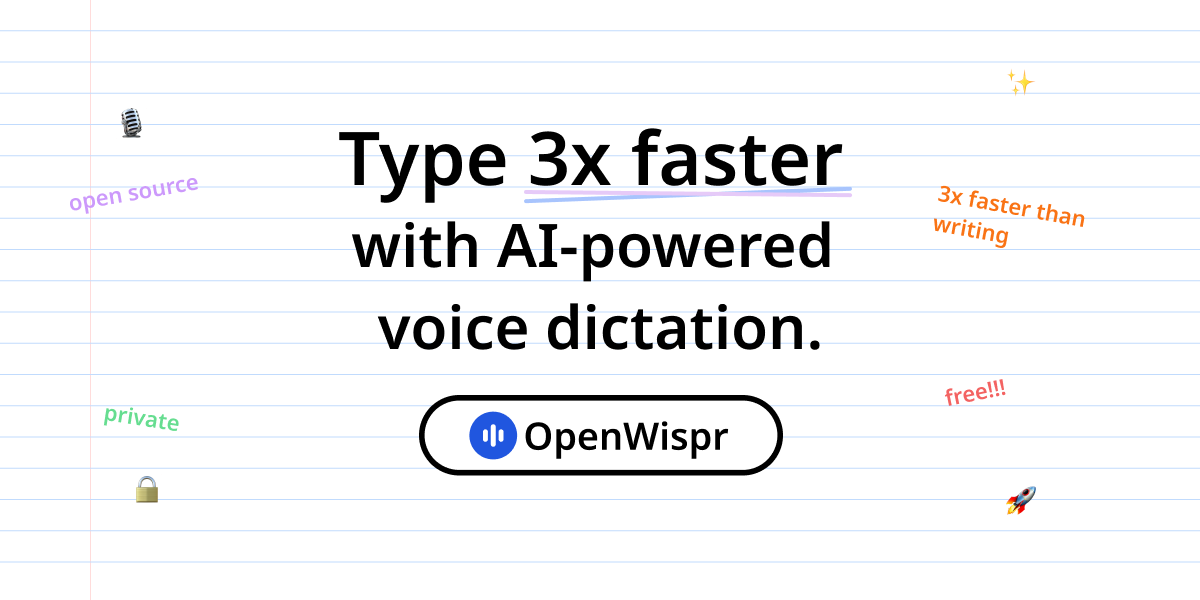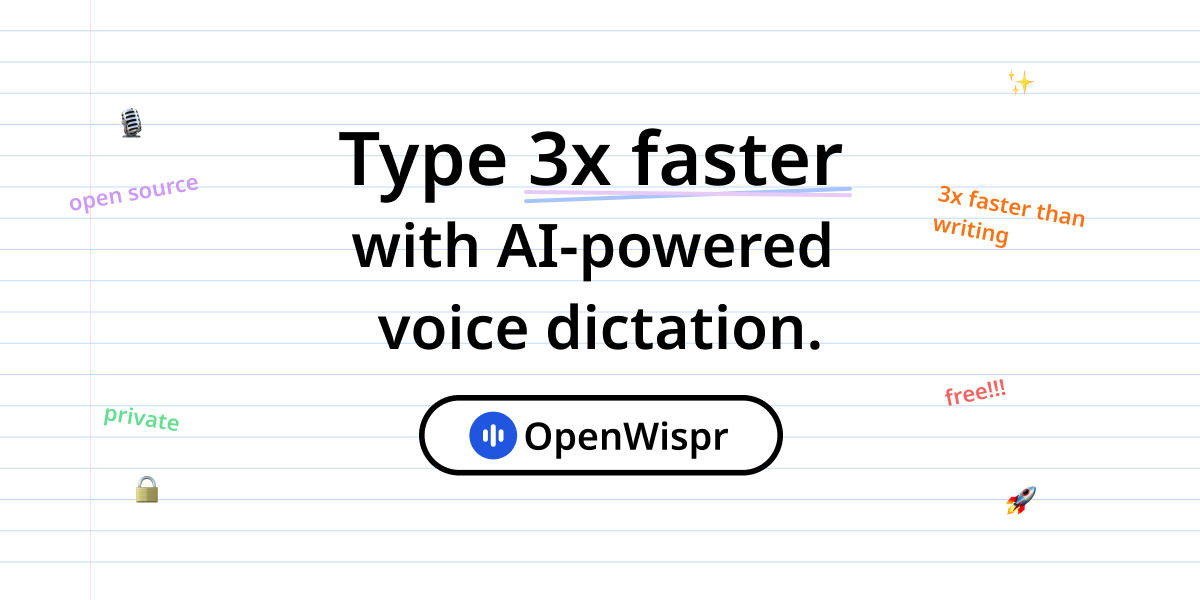
Table of Contents
Overview
Transform your productivity with the power of voice computing. OpenWispr represents a revolutionary approach to speech-to-text technology, combining the accuracy of OpenAI’s Whisper models with complete privacy control and open-source transparency. This innovative desktop application eliminates the traditional barriers between thought and text, enabling users to dictate content up to 5 times faster than typing while maintaining absolute control over their data. Whether you’re crafting complex prompts for AI models, composing professional emails, or generating creative content, OpenWispr provides a seamless bridge between natural speech and polished text output.
Key Features
OpenWispr delivers comprehensive voice-to-text capabilities designed for privacy-conscious users and productivity enthusiasts:
- Local and cloud processing options: Choose between 100% private local processing using downloaded Whisper models or faster cloud processing via your own OpenAI API keys, ensuring complete control over your data flow
- Open-source transparency: Fully open-sourced under MIT license with complete code visibility on GitHub, enabling community contributions, security audits, and customization for specific needs
- Multiple Whisper model support: Select from tiny, base, small, medium, and large models to optimize the balance between processing speed and transcription accuracy based on your hardware capabilities
- Intelligent system prompt customization: Configure AI-powered text cleaning, formatting rules, and output styles to match specific use cases, from technical documentation to creative writing
- Global hotkey activation: Start and stop dictation instantly from any application using customizable keyboard shortcuts, with real-time transcription that automatically pastes formatted text at cursor position
- Cross-platform compatibility: Native support for macOS, Windows, and Linux with consistent functionality across all operating systems and seamless integration with existing workflows
How It Works
OpenWispr streamlines voice-to-text conversion through an intuitive, privacy-focused workflow. Users begin by installing the application and selecting their preferred processing method—either local Whisper models for complete privacy or cloud-based processing for enhanced speed. The system captures voice input through a global hotkey, processes speech using advanced AI models, and applies customizable formatting rules to produce clean, professional text output. The draggable dictation panel provides visual feedback during recording and processing, while the comprehensive control panel manages settings, transcription history, and model configurations. For local processing, OpenWispr automatically handles Python environment setup and Whisper model downloads, ensuring a smooth experience regardless of technical expertise.
Use Cases
OpenWispr serves diverse voice-to-text applications across personal and professional contexts:
- AI prompt engineering and LLM interaction: Rapidly dictate complex, detailed prompts for language models, enabling more natural and efficient AI conversations while maintaining the nuanced tone that comes from spoken communication
- Professional documentation and content creation: Generate technical documentation, meeting notes, blog posts, and creative content through natural speech, significantly reducing the time investment required for written communication
- Accessibility and ergonomic computing: Provide essential support for users with typing difficulties, repetitive strain injuries, or physical limitations, offering a viable alternative to traditional keyboard input methods
- Secure transcription for sensitive environments: Handle confidential information, legal discussions, and proprietary business content without cloud dependency, ensuring complete data sovereignty and privacy compliance
- Software development and coding support: Dictate code comments, documentation, commit messages, and technical specifications while maintaining focus on development tasks and reducing context switching
- Academic research and note-taking: Capture research insights, lecture notes, and academic discussions with high accuracy, supporting scholarly work with efficient voice-based input methods
Pros \& Cons
Understanding OpenWispr’s capabilities and limitations enables informed decision-making:
Advantages
- Complete privacy control through local processing options that keep sensitive audio data entirely on your device, eliminating cloud-based privacy concerns and ensuring compliance with strict data protection requirements
- Exceptional speed improvement of 3-5x faster text generation compared to traditional typing, dramatically enhancing productivity for content creation, communication, and documentation tasks
- Extensive customization capabilities through prompt engineering, model selection, and output formatting, allowing users to tailor the experience for specific workflows and professional requirements
- Zero recurring costs for local processing after initial setup, providing long-term value without subscription dependencies or per-minute usage fees
- Professional-grade accuracy through access to state-of-the-art Whisper models, delivering reliable transcription quality suitable for business and academic applications
Disadvantages
- Technical setup requirements for optimal performance, including Python environment configuration and model downloads that may challenge less technical users despite automated installation features
- Hardware dependency for local processing performance, with older machines potentially experiencing slower transcription speeds and limited model size options
- Limited mobile integration as a desktop-focused solution, requiring workarounds for users seeking comprehensive voice-to-text capabilities across all devices and platforms
- Learning curve for advanced features like custom prompts and agent naming, which may require experimentation to achieve optimal results for specific use cases
How Does It Compare?
In the evolving landscape of voice-to-text solutions, OpenWispr distinguishes itself through unique positioning against specialized and mainstream alternatives:
Whisper WebUI projects like jhj0517/Whisper-WebUI provide browser-based interfaces for OpenAI Whisper with features including YouTube transcription, speaker diarization, and subtitle generation. While these offer comprehensive transcription workflows, they lack OpenWispr’s real-time dictation capabilities, global hotkey integration, and optimized desktop experience designed for productivity enhancement.
Talon Voice represents the premium solution for voice-controlled computing, offering sophisticated command-based speech recognition specifically designed for developers and power users. Priced at \$20+ monthly for full features, Talon excels in coding workflows, precise command execution, and extensive customization. However, it requires significant technical expertise and serves a more specialized audience compared to OpenWispr’s accessible dictation focus.
Otter.ai dominates the cloud-based meeting transcription market at \$12.99-16.99 monthly, providing real-time collaboration, speaker identification, meeting summaries, and extensive integration with productivity platforms. While excellent for team environments and meeting workflows, Otter lacks offline capabilities, privacy control, and the customizable text processing that defines OpenWispr’s approach.
Dragon Professional remains the enterprise standard for dictation software, offering 99% accuracy and extensive customization at \$549.95 for academic pricing. Dragon excels in medical and legal environments with specialized vocabularies but requires significant investment and lacks the open-source flexibility and modern AI integration that OpenWispr provides.
Native OS dictation tools (macOS Dictation, Windows Speech Recognition) provide basic voice-to-text functionality but lack advanced features like custom prompt processing, multiple model options, and the privacy control essential for professional use cases.
OpenWispr’s competitive advantage lies in combining enterprise-grade accuracy with open-source transparency, offering both privacy-focused local processing and the flexibility to integrate with modern AI workflows—a unique positioning in the current market landscape.
Final Thoughts
OpenWispr represents a significant advancement in democratizing high-quality voice-to-text technology, successfully bridging the gap between enterprise-grade dictation solutions and accessible, privacy-focused tools. By combining the proven accuracy of OpenAI’s Whisper models with complete user control over data processing and extensive customization options, it addresses critical needs in today’s digital workflow environment. The open-source approach not only ensures transparency and community-driven development but also provides long-term sustainability and customization potential that proprietary solutions cannot match. While the technical setup requirements may present initial challenges for some users, the combination of significant productivity gains, privacy control, and zero recurring costs makes OpenWispr a compelling choice for professionals, researchers, and privacy-conscious users seeking to harness the transformative power of voice computing. As remote work and AI-assisted workflows continue to evolve, tools like OpenWispr that prioritize both functionality and user autonomy will likely play increasingly important roles in modern productivity ecosystems.

